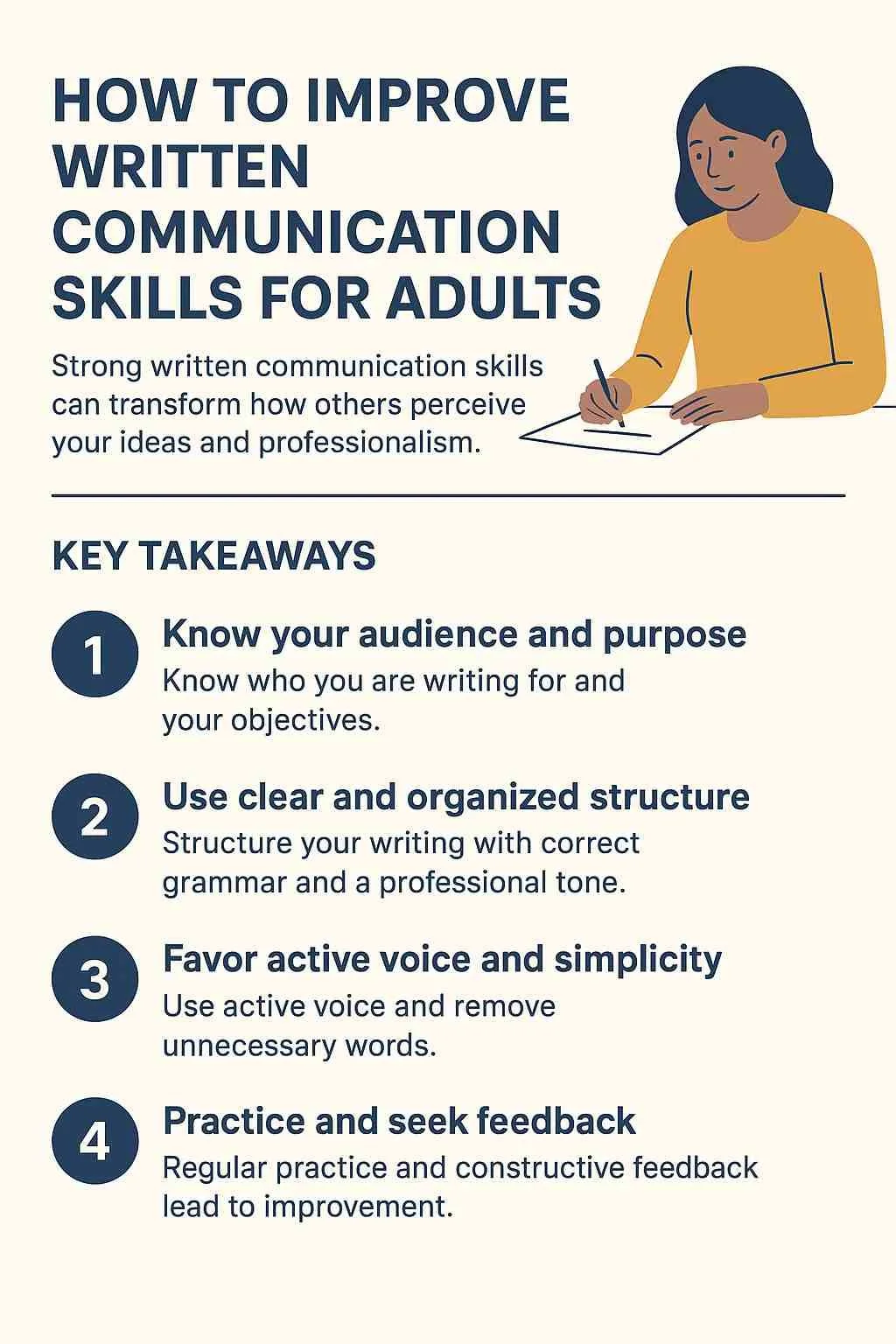How to Improve Written Communication Skills for Adults
Since we are now in the world of constant emails, texts, and digital communication, your writing often speaks before you do. Clear, confident writing sets you apart, helps you build trust, and ensures your message is taken seriously. Strong writing shows respect for your reader and makes your ideas easier to understand.
With practice, feedback, and attention to tone and grammar, anyone can sharpen their written communication skills.
Key Takeaways
Clear writing begins with knowing your intended audience and purpose before you start writing.
Strong written communication skills rely on structure, correct grammar, and an appropriate professional tone.
Using active voice and removing unnecessary words helps create more direct and effective communication.
Regular practice and constructive feedback lead to consistent improvement in your writing abilities.
Why Written Communication Skills Matter
How to Improve Written Communication Skills
Writing Skills in the Workplace
Frequently Asked Questions About Improving Written Communication Skills
Why Written Communication Skills Matter
Writing is one of the most important forms of communication. Every message, from a quick text to a detailed report, becomes a lasting record of your thoughts and your image. Strong writing skills show that you can organize ideas clearly and communicate effectively in any context.
In the workplace, effective written communication supports teamwork, builds trust, and helps you achieve shared goals. Employers value professionals who express ideas with clarity and precision, and developing these skills strengthens both your credibility and your reputation.
In personal life, the same principles apply. Texts, emails, and social media posts all leave an impression. Clear writing shows respect for your reader, reduces misunderstandings, and helps maintain trust in relationships. When you write with clarity and precision, your words strengthen connections and ensure your message is received the way you intend.
How to Improve Written Communication Skills
Know Your Audience for Effective Written Communication
Before you write, take time to understand your intended audience and their expectations. The tone and level of detail in business writing may differ from a personal message. Adapting your approach helps you convey your ideas respectfully and effectively.
Knowing your audience also guides your word choice and organization. Too much information can overwhelm, while too little can confuse. Write with clarity, and always consider how your words will sound to your reader.
Focus on Clarity and Organization in Writing
Good organization helps your audience follow your ideas easily. Begin each written message with your main idea, then support it with key points and examples. Short paragraphs, bullet points, and clear transitions make your writing easier to read.
Clarity also depends on word choice and tone. Avoid unnecessary jargon or fancy words that could distract from your meaning. Focus on simplicity and precision to make your writing more effective and professional.
Use an Active Voice to Strengthen Written Communication
An active voice strengthens your message by showing action and responsibility. For example, “The manager reviewed the report” is clearer than “The report was reviewed by the manager.” Writing in active voice helps readers stay engaged and understand who is doing what.
This approach also removes unnecessary words and keeps sentences concise. Writing effectively means communicating your point with energy and purpose. An active style helps your writing sound confident and direct.
Develop a Professional Tone in Business Writing
Your tone shapes how others interpret your message. A professional tone is polite, confident, and appropriate for the situation. In business communication, tone can vary depending on context, but it should always convey respect.
Avoid slang, sarcasm, or humor that might be misunderstood in written communication. Use capital letters correctly and review your grammar for accuracy. The right tone shows care and builds credibility in every written interaction.
Executive Voice Coaching
Check out our blog about executive voice coaching to refine your professional tone.
Give and Receive Constructive Feedback to Improve Writing Skills
Constructive feedback is one of the most valuable tools for improving your writing abilities. Asking someone to review your work helps you identify unclear sentences or weak organization. Feedback offers insight into how others interpret your message and how you can improve it.
When giving feedback, focus on key points and use a positive, respectful tone. Point out what works before suggesting changes. Over time, this exchange of feedback strengthens both your writing and your overall communication skills.
Practice Writing Regularly to Build Communication Skills
Improvement in writing takes regular practice. Set small goals, like writing a short paragraph each day, to keep your skills sharp. Writing often helps you learn how to organize thoughts, use correct grammar, and develop your own voice.
Reading also plays a big role in growth. When you read high-quality articles, business reports, or blogs, you see examples of effective written communication in action. This exposure helps you understand how others organize ideas and adjust tone for different audiences.
Writing Skills in the Workplace
Business Writing and Professional Communication Skills
In business communication, how you write affects how people respond. Clear, direct, and polite writing makes it easier for teams to share ideas and make decisions. Well-written messages save time, reduce confusion, and build stronger professional relationships.
Emails, reports, and presentations should follow the basic rules of good writing: clarity, brevity, and organization. Effective business writing helps you convey your message efficiently and shows that you can communicate professionally in the workplace.
Using Tools to Improve Effective Written Communication
Modern tools can help you communicate more clearly. Spell checkers, grammar tools, and readability checkers catch small mistakes and suggest improvements. However, they can’t replace your judgment or sense of audience. Always reread your message before sending it.
Writing apps, templates, and style guides can support your organization and consistency. Still, developing your communication skills depends on reflection and practice. The more you write, the easier it becomes to choose the right tone and structure for every situation.
Frequently Asked Questions About Improving Written Communication Skills
1. What are the most important written communication skills?
The most important written communication skills include clarity, correct grammar, tone, and organization. These skills help you write letters, reports, and messages that are easy to understand. They also improve your professional image and confidence in business communication.
2. How can I improve my writing skills quickly?
To improve your writing skills quickly, write short messages every day and review them for clarity and tone. Reading your work aloud helps you find errors and improve sentence flow. Consistent practice and feedback are the fastest ways to develop good writing skills.
3. Why is effective written communication important in business?
Effective written communication helps teams share ideas clearly and prevents mistakes. Every written message can influence a company’s reputation, so clarity and tone matter. Writing effectively builds trust, saves time, and shows professionalism in every exchange.
4. How does feedback improve written communication?
Feedback improves written communication by helping you understand how others interpret your message. It highlights areas for improvement and encourages better organization and tone. Constructive criticism strengthens both writing and overall communication abilities.
5. What is the difference between written and verbal communication?
The main difference is that written communication creates a lasting record, while verbal communication relies on tone and non verbal cues. Writing requires structure and grammar since the reader can’t ask questions in real time. Both forms are valuable communication skills that support success in the workplace.
How Connected Speech Pathology Can Help
At Connected Speech Pathology, our communication coaches provide individualized support to help adults strengthen their written communication skills for both professional and personal situations.
We help clients refine workplace writing, such as emails, reports, and presentations, as well as personal communication, like letters or applications. Sessions focus on clarity, organization, and tone so that every message is professional, respectful, and easy to understand.
All services are delivered online, making it possible to connect with an expert from anywhere. With tailored strategies and constructive feedback, clients gain the confidence to write with precision and impact in every area of life.
Summary
Improving your written communication skills helps you connect ideas clearly and build a stronger professional image. Writing effectively shows care, attention, and respect for your audience. With focus on clarity, tone, and practice, your written words can have more impact in any setting.
Each written message shapes how others see your professionalism and thought process. By improving your writing skills and seeking feedback, you can communicate with confidence and purpose.
About the Author
Allison Geller is a communication coach, speech-language pathologist, and founder of Connected Speech Pathology, an international online practice providing professional communication coaching and speech therapy for children, teens, and adults. With more than two decades of experience, she has worked in medical and educational settings, published research on aphasia, and leads a team of specialists helping clients improve skills in public speaking, vocal presence, accent clarity, articulation, language, fluency, and interpersonal communication.








